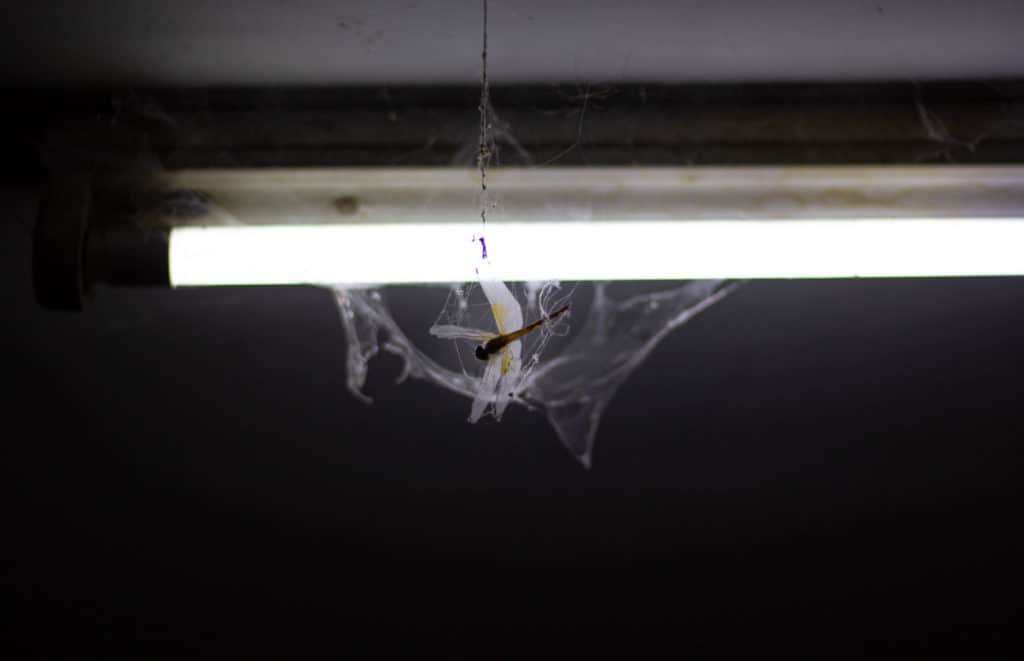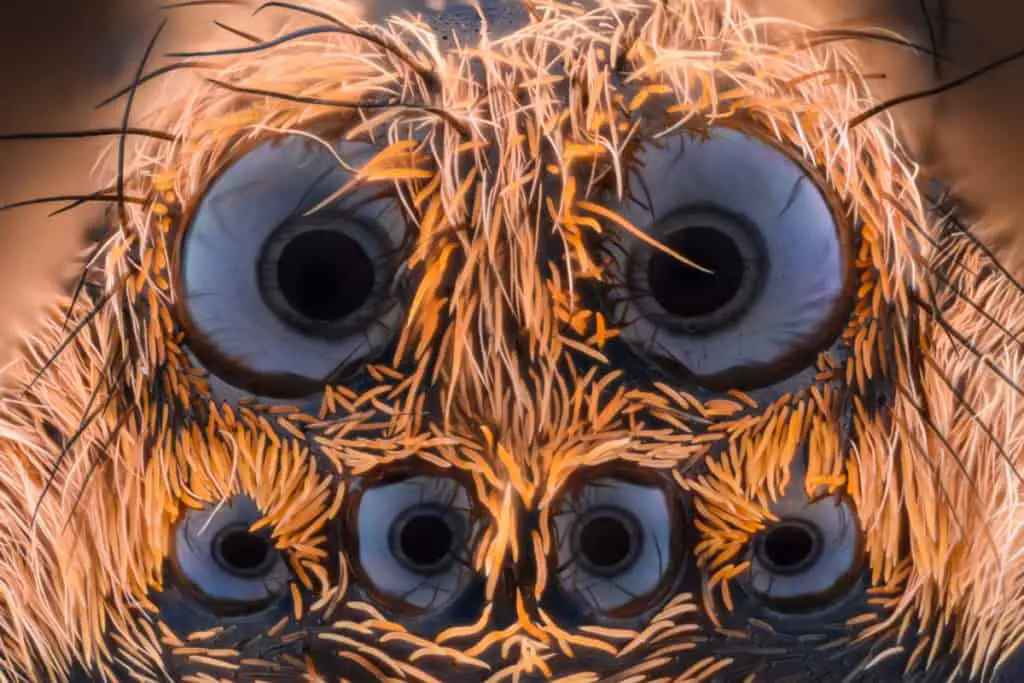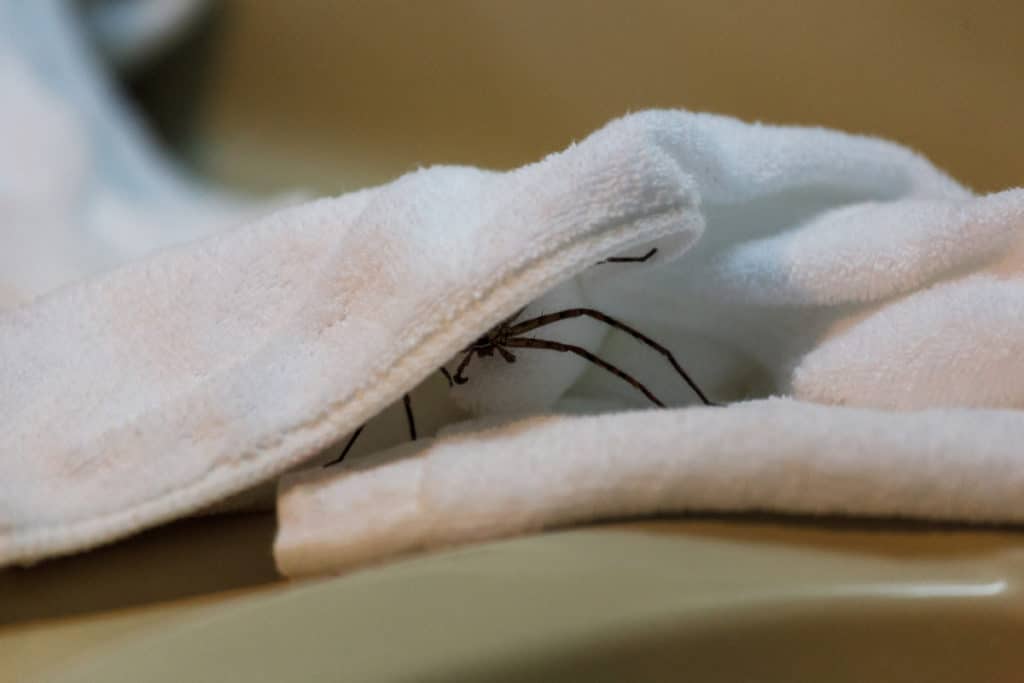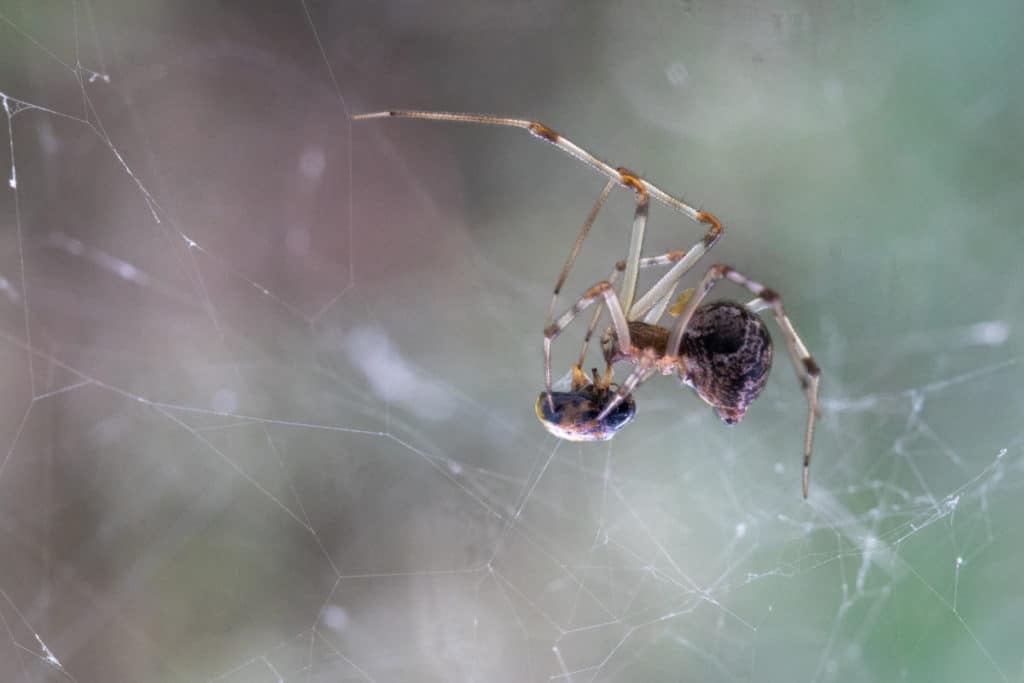Have you ever seen a spider web surrounding a porch light, or noticed that your common squatters- the house spiders seem to like spending time by windows?
If your answer is yes, then you probably have wondered, are spiders attracted to light?
Spiders are not naturally attracted to light, this is due to their poor vision. They have however worked out that their prey is attracted to lights, so building a web around lights outside your home ensures they can easily catch and eat their favorite bugs and insects.

Do spiders need light to see? Are spiders attracted to light or to the insects that are drawn to light? What is the effect of artificial light on spiders’ behavior?
Read on to find the answer to these questions.
Do Spiders Need Light to See?
Considering that spiders usually have eight eyes, most of us would assume they have good eyesight. As it turns out, not all eyes are created equally and despite having so many of them, some spiders have bad eyesight.
The majority of these spiders can only make out vague differences between light and dark. This is not a problem as most spiders can use other sensory organs to navigate their surroundings.
However, day-hunting spiders (diurnal spiders) require light to locate their next meal.
Among these species is the jumping spider. While compared to other spiders, they have phenomenal seeing abilities, the jumping spider still needs light to hunt. So much so, that the species would retreat in their silken homes on dark or cloudy days, rather than go hunting.
The Biophysical Society of Japan conducted several experiments with jumping spiders and different light waves. They were able to conclude that jumping spiders need a green light to accurately calculate their jumps.
A flower spider is another example of a spider that requires light to function and prefers to do their hunting in well-lit places.
If you are interested in a complete guide to what spiders eat and how they hunt their prey then check out this article we have written, What Do Spiders Eat?
Can Spiders See in the Dark?
Even though most spiders have poor eyesight, there are two notable exceptions such as wolf spiders and net-casting spiders.
Being hunters, wolf spiders have incredible vision. Preferring to hunt around dusk or by moonlight, their well-developed tapeta (an iridescent layer in the eye) enables them to spot movement.

The enlarged lenses and light-sensitive membrane of the net-casting spiders’ eyes, allow the spider to concentrate available light. They can do this better than cats or owls, making them a formidable night time predator.
Did you know that wolf spiders also carry their babies around with the on their back? We have some photos of this in another article we have written called, What Are Baby Spiders Called?
Are Spiders Attracted To Lights, Because Insects Are Them?
It is easy to conclude that we find spiders near light because their prey likes light. However, several experiments show the possibility that some spiders have evolved to like artificial light and that exposure to UV light can enhance the webs of certain spiders.
For some spiders, such as the orb-weaver, building webs near light provides a clear advantage in catching flying insects that are attracted to light. However, some other studies show that this relationship may not be that simple.
Scientists monitored captive-born orb-weavers who had no experience in hunting. They found that these spiders also choose to build webs near artificial lights. They concluded that after generations exposed to the feeding benefits of artificial light, orb-weavers developed an evolutionary predisposition to prefer building webs near artificial light.
Another study confirms these results. Researchers in Germany and Denmark conducted a study where they took Steatoda Triangulosa (a common spider) eggs from rural areas and eggs from urban areas.
Once the eggs hatched the researchers observed the spiderlings’ behavior towards the light. They found that spiders from eggs collected in urban areas were more likely to build webs near light sources than spiders from rural areas.
They concluded that certain types of spiders were evolving to like artificial light.
The attraction to artificial light for night hunting orb-weavers makes sense, but what about the diurnal orb-weavers who seek out sunny corners, fields, or branches?
Experiments done on the effects of UV light on spiders’ webs found that diurnal spider webs and glue are impervious to radiation and exposure to UV enhances spiders’ silk performance.
All of these factors make a strong case for why spiders might be attracted to light.
How Does Artificial Light Impact Spiders’ Behavior?
Like all creatures, light plays a significant role in a spider’s habits and behavior. It affects their ability to mate, communicate, catch prey, and their orientation.
Spiders use UV reflections on themselves and their webs to attract prey, communicate, and warn off predators. Artificial light disrupts many of these spiders’ habits and abilities.
Chronic exposure to artificial light has also been shown to accelerate spiders’ development, decrease female spiders’ egg count, and reduce overall body size.
Interestingly, if spiders are deprived of gravity, as two spiders at the international space station were, they will use light to orientate themselves and their webs.
Are Spiders More Active At Night Regardless Of Light?
Artificial light can reduce the night-time activity levels of some nocturnal spiders. However, they will still be more active at night than during the day.
The wolf spider, for instance, is most active when it is dark and warm.
Though artificial light will have limited effects on nocturnal spiders, they do encourage diurnal spiders to be active at night.
Will Leaving A Light On In The Bathroom Keep Spiders Away?
The short answer is no, leaving a light on will not keep spiders away. As we have discussed, many spiders have become attracted to light because their prey is attracted to light.
Even spiders who normally scuttle away when a light comes on will make an exception if there is a high potential for food.

If the goal is to keep spiders away, turning off lights (particularly outdoor lights) will be more effective than keeping them on.
Which Spiders Are Active In My House At Night?
The type of spiders that are active in your house at night will depend on where you live.
If you are in North America a few of the most common types of nocturnal spiders found in homes are; sac spiders, cellar spiders, cobweb (or comb-footed) spiders, and orb-weavers.
The spider you are most likely to see lurking in your house at night is the American house spider. You could probably find an eight-legged intruder in the room with you right now. This is a type of comb-footed spider and is also called the common house spider. It can be found in homes around the world.

Like many household spiders, the common house spider is small, with a body that is typically brown and lighter-colored legs.
Though all of these spiders can be found indoors at any time, you are more likely to come across them throughout the winter season.
Many spiders will try to move inside around the end of August, hoping to find warm accommodations till March.
The spiders living in your house without paying rent are likely to be shy and nonaggressive. Moreover, far from being a pest, the house spider can be considered useful; for the most part, these domesticated spiders will hang out and quietly clean your house.
They are not likely to crawl across your bed at night.
Here is a related question we often get asked. Do Spider Eat Roaches? Could it be that having spiders in your house can help control roaches?
Do LED Lights Attract Spiders?
While the exact effect on spiders is unknown, we do know that insects are not attracted to warm light LED bulbs. This is helpful because we know that most spiders spend their time around your light as a way to catch more bugs.
After conducting a study of over 8887 insects and spiders, researchers found that Incandescent bulbs attracted the most insects, while warm LEDs and bug lights were the least popular.
In theory yellow bulbs should be effective as well. Given that yellow wavelengths are longer than what most insects and spiders can see. However, there is conflicting evidence of the effectiveness of yellow light.
The Wrap Up
There is a lot of misinformation out there about spiders and light. Leaving lights on to scare away spiders is not a solution.
At best you will disrupt the spider’s nighttime activities as well as your own sleep, at worst you will attract more spiders and insects.
From all of the studies on the effects of artificial light on spiders, it is clear that humans have had a tremendous impact on our environment. To degrees of which we are only now starting to understand.
So let us be conscientious of the creatures sharing our personal space and turn off the light.
Sources
https://www.zmescience.com/other/did-you-know/common-spiders-living-house/
https://entomology.ca.uky.edu/ef622
https://www.jstor.org/stable/24887759?seq=1
https://www.ncbi.nlm.nih.gov/pmc/articles/PMC4629671/
https://www.sciencedaily.com/releases/2020/12/201209115149.htm
https://www.ncbi.nlm.nih.gov/pmc/articles/PMC6183507/#__sec1title
https://jeb.biologists.org/content/218/17/2675#sec-2
https://link.springer.com/article/10.1007/s002650050590
https://australian.museum/learn/animals/spiders/how-spiders-see-the-world/
